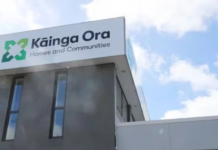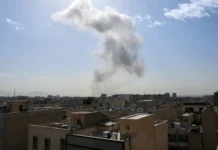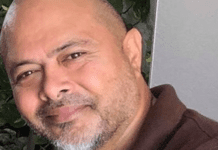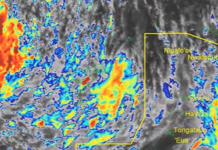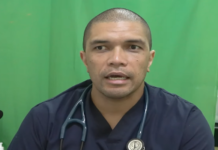By Lydia Lewis of rnz.co.nz and is republished with permission
Handy craft stall owners in Tonga’s capital Nuku’alofa are hoping that the economic activity generated by delegates attending the 53rd Pacific Islands Forum Leaders’ Summit (PIFLM53) this week will boost their incomes, as ordinary Tongans continue with their daily grind to recover from the impacts of the 2022 earthquake and tsunami.
Tonga handicraft on display. Photo: RNZ Pacific / Lydia Lewis
More than 1000 people are heading to the Kingdom for the annual event, where 18 Pacific leaders come together each year to make big decisions as a Pacific family.
Issues to be talked about a numerous, including the climate crisis, the ongoing crisis in New Caledonia, United States territories America Samoa and Guam’s bids to become associate members, the seasonal worker brain drain, freer travel around the Pacific, making it easier for Pacific island nations to access climate finance to prepare for disaster, human rights issues in Indonesia’s West Papua, deep sea mining, and an update on PIF regional architecture.
But for locals, Tonga hosting the summit means it offers a much-needed cash injection to the nation, which is still recovering from the Hunga-Tonga Hunga Ha’apai eruption and tsunami.
Linda Vahai Alatini, 49, who was taught how to make taʻovala, fine Tongan mat worn around the waste, by her great grandmother, now teaches her children and sells goods at Nuku’alofa’s Talamahu Market.
Alatini, who spoke to RNZ Pacific with Amelia Taufa, 65, said they were looking forward to sharing her art with the PIFM53 guests.
Tonga handicraft on display. Photo: RNZ Pacific / Lydia Lewis
But Alatini said she also wanted to remind Prime Minister Hu’akavameiliku Siaosi Sovaleni – incoming PIF chair – to make decisions in the interests his people.
“We want the government to help us here in the market”, she said, adding “we make our own handicraft here so [the government needs to] pick us to go and sell” the locally made products when they attend overseas expos to promote Tonga.
Another vendor, Betsy Lori – a single mum of eight works six days a week at the market to support her children in higher education.
She sells kiekie, a traditional Tongan garment worn by women made out of plant fibres from pandanus, hibiscus and coconut.
She said the busiest time for her small business to “make a big income” was December during Christmas holidays when Tongans overseas send money back home to their families, and while she did not know the nitty-gritty of what PIFL53 is about, she hopes the influx of guests will boost profits.
Bety Lori at the Talamahu Market. Photo: RNZ Pacific / Lydia Lewis
“It’s so tough to stay here in Tonga. So, we were so happy to see [delegates] here…because when they will spend money, and you know help our economy.”
When asked what changes Pacific leaders could make to support Tongans, Lori said visa free travel would ease the burden greatly.
She said she has spent a lot of money and time applying for visas to Australia, New Zealand, and the US.
Several Pacific leaders are already in Tonga, while other will be arriving tonight in the coming days. Among the high-level attendees are also the United National secretary-general Antonio Guterres and the Commonwealth Secretariat head Patricia Scotland.
New Zealand is sending three delegates to the Pacific Island Forum Leaders’ Week.
Foreign Minister Winston Peters and Minister for Pacific Peoples Dr Shane Reti will attend the first half of the week, with prime minister Christopher Luxon attending the second half.
Peters said New Zealand’s high-level participation in Leaders’ Week reflects the importance the government places upon deepening its relationships in the region.
Tonga handicraft on display. Photo: RNZ Pacific / Lydia Lewis
‘Incredibly crowded’ summit
A Pacific politics says regional leaders will have their dance cards full at the Forum.
Massey University security studies associate professor Anna Powles told RNZ Pacific this year will be the first time since the pandemic that dialogue partners, like the US and China, get to meet face to face with PIF leaders.
- Download as Ogg
- Download as MP3
- Download as AAC
- Play Ogg in browser
- Play MP3 in browser
- Play AAC in browser
“It’s going to be incredibly crowded, busy meeting.” -Massey University’s Anna Powles
She said: “It’s going to be incredibly crowded, busy meeting”.
But top of the agenda will be the ongoing unrest in New Caledonia, she said.
“It will certainly be an issue that will be discussed in terms of how to plan forward and the role of the forum moving forward, with respect to New Caledonia,” she said.
“It is also an opportunity for the New Caledonian government delegation to talk about the issues with forum members without France in the room.”
Powles said other big-ticket items for the meeting will be Japan’s Fukushima treated nuclear wastewater release and climate change, with Guterres expected to make an appearance, the review of the regional architecture and the Fijian Prime Minister Sitiveni Rabuka’s ‘zone of peace’ proposal.
She said the Australia-Tuvalu Falepili Union treaty was expected to be a talking point, “but that’s likely to be low key at this stage, whilst there’s broader consultation and support being built for it”.
Griffith Asia Institute’s Pacific lead, Tess Newton Cain said it will be interesting to what the leaders decide on the Guam and American Samoa’s associated membership bid.
She said the PIF regional architecture is under review and that includes the its membership structure.
“It would be a very bad look, diplomatically, if they were to allow [Guam and American Samoa] to become associate members and then in a couple of years and say, ‘oh, we’ve changed the rules now and you no longer qualify’,” Tess Newton-Cain told RNZ Pacific.
The meeting officially starts on Monday.





